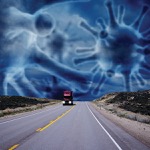By Marie Rosenthal, MS
One in eight people who had COVID-19 experienced fatigue that lasted three months or more, according to a recent multicenter study (Clin Infect Dis 2023 Jan ciad045 https://doi.org/10.1093/cid/ciad045).

“When you look at the overall number of cases of severe fatigue, one in eight patients affected with COVID had severe prolonged fatigue at three months,” said Michael Gottlieb, MD, a co-principal investigator of the study.
Many of the studies that have been done to date are “looking at what's been reported in electronic medical records, which may or may not reflect what people are actually experiencing,” he noted.
“One of the things that we've really tried to do with this study is engage our patients and try to actually understand what they're experiencing,” explained Dr. Gottlieb, an associate professor and the director of emergency ultrasound, Department of Emergency Medicine at Rush University Medical Center, in Chicago.
Dr. Gottlieb and his colleagues prospectively looked at adults, who were a mix of people with COVID-19 symptoms who tested positive, as well as some who tested negative but were symptomatic. The patients were enrolled during three phases of the pandemic: before the delta wave (n=463), during delta (n=1,198) and during the initial omicron wave (n=741).
They followed the participants for 18 months as part of INSPIRE (Innovative Support for Patients with SARS-CoV-2 Infections Registry), which is a multicenter study that is looking at the long-term effects of COVID-19.
In this study, the participants received surveys either by email or text about a variety of issues, including symptoms during and after COVID-19; demographics; vaccination status; and physical, mental and social well-being. They also answered questions about cognitive status and when they returned to work or resumed daily activities.
The investigators wanted to measure the severity of fatigue because there is wide variation in types of fatigue and societal impact. “A mild fatigue is much different than severe life-impacting fatigue,” Dr. Gottlieb said, during a briefing sponsored by the Infectious Diseases Society of America.
In addition to the questionnaires, the investigators were able to review some patients’ electronic health records, which were used to supplement vaccination data and determine whether they were positive or negative for COVID-19.
This report included 2,402 people who were COVID-19?positive and 821 who were negative. Most did not require hospitalization for COVID-19.
More people reported severe fatigue during the pre-delta period than the delta and omicron waves, they found. However, after adjustment for several variables, including vaccination status, the differences among the three periods were not significant. The data showed that as more people were vaccinated, they were less likely to suffer long-COVID symptoms, according to Dr. Gottlieb.
“We had groups across all three time frames, and when we first assessed fatigue at three months, there was a difference. We saw, pre-delta, a much different rate of severe fatigue and the presence of what we called multiple symptoms, or at least three symptoms present at three months compared with the other variants.
“But then we dove a little further because things have changed over the course from pre-delta to delta to omicron,” he said. Different groups of patients were affected during each wave, and there was an effect of widespread vaccination from pre-delta through the two waves, with less severity of disease and fewer hospitalizations after mass vaccination.
“When you accounted for other variables, specifically things like vaccination and the populations affected, that number went away—suggesting there seems to be an impact on vaccination to reducing the risk of long-COVID across these variants,” Dr. Gottlieb explained.
“One of the things that has definitely correlated with reduced severity of COVID-19 is prior immunity, whether it's prior immunity from vaccination or prior immunity from previous COVID or both. We've known in multiple other studies that less severe COVID-19 leads to a lower likelihood of long-COVID. It doesn't eliminate the possibility, but it makes it less likely,” said Paul Sax, MD, the clinical director of the Division of Infectious Diseases at Brigham and Women's Hospital and a professor at Harvard Medical School, in Boston, as well as the editor-in-chief of Clinical Infectious Diseases.
“The finding that vaccination reduces the likelihood of getting this really dreaded complication of COVID is important and shows that, really, people who might be hesitant about getting vaccinated should think about this as a potential benefit beyond the one that is probably most widely publicized, which is the prevention of severe disease,” he added.
Dr. Sax, who was also present at the briefing, said the study was important because it was prospective, which provided a more accurate picture of people’s experience. “The thing I think is so strong about the study is that it has a control group. And some of them also suffered from fatigue, showing that it is not just COVID that can lead to this post-infectious problem.
“This study highlights, I think overall, the importance of long-COVID and how much we need to learn, not just about post-COVID syndromes, but it underscores that there is a long history of post-infectious fatigue syndromes of various sorts,” Dr. Sax said.
He said many conditions, including Epstein-Barr virus and Lyme disease, can be a cause of chronic fatigue, but COVID-19 has put a “real spotlight on this as a complication of infectious diseases.”
Dr. Gottlieb agreed, calling for more study about long-COVID, and the societal effects of long-term fatigue.
Luckily, he said, “the odds are going down,” and fewer new patients are reporting long-COVID.
“There's definitely been a decreased incidence of this complication over time, but there's still a huge number of people who are suffering from prolonged symptoms. So, this is both the good news and not so good news,” Dr. Gottlieb said.




